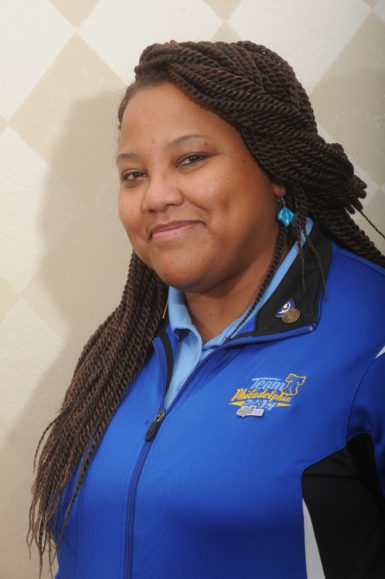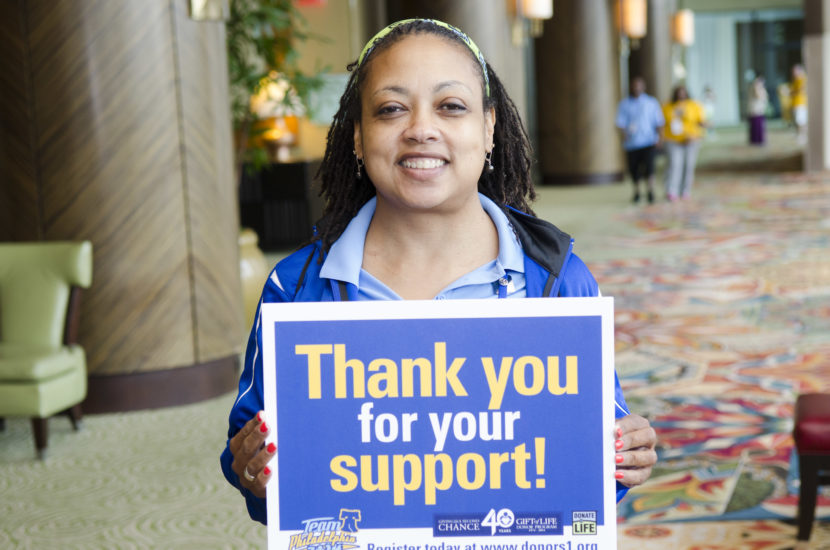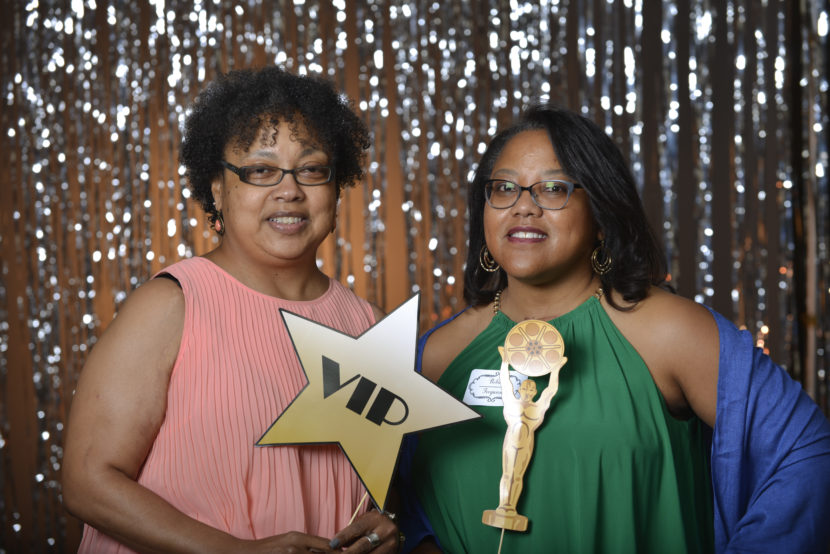In 1983, Nanci Woodson was a senior in high school. She came down with what she then believed was the flu. After nearly two weeks of being sick and having a high fever, she knew it was time to go to the hospital. The results from her blood tests showed that her kidney function was only at 15%, so doctors gave her medication to treat the issue. Within a year, her kidney function was in a healthy range.
Nanci was blessed with ten years of health after her frightening experience senior year. At 28, her kidneys began to fail again. Her nephrologist told her that she was in end stage renal disease, and that she would need to begin dialysis. Her only option at that point was to wait for a life-saving kidney or find a living donor. “I was in such shock when doctors told me that I needed a transplant. I didn’t even know what dialysis was. I was really scared, and after that day my health and outlook really went downhill.” said Nanci.
She started to learn more about living donation during this time, and her sister, Robin, stepped up and said that she wanted to be tested. Nanci’s health was seriously worsening. In just a four month period, Nanci lost 30 pounds – going from a size 12 to a 2. She had shrunk to a fragile weight, and was exhausted and unable to keep her body warm. After four months of testing, Robin was a match, and as a member of the U.S. Air Force, received special permission to donate to her sister.

The surgery was successful and Nanci woke up post-transplant feeling completely different. She had always been tired throughout her young life, and said that after receiving her sister’s kidney, she immediately felt good. She experienced a decade of good health until sadly – tragedy struck once again.
This time, she had a serious bacterial infection, and it attacked and destroyed her functioning kidney. “I was added to the organ transplant waitlist, and had to start dialysis. This was much different than the first time I needed a kidney. It was my first experience with dialysis and fluid and food restrictions. I had to have a fistula put in my arm. It was really depressing to be in dialysis 12 hours a week and to be so sick. I met so many people in dialysis – and many of them died while waiting.” Nanci said.
She desperately wanted to receive a kidney and get her life back. “I had a lot of down times during my wait. It wasn’t a positive time for me.” she said. Her wait was 3.5 years, and she said that she would not have been able to do it without the support of her family. Her parents passed away when she was a child, but she is one of nine children and had an abundance of support from her siblings. She also has a brother, Tracy, who is currently waiting for second kidney transplant. Their sister, Linda, was a living donor for him when he received his first transplant.
After over three years of suffering, Nanci received the gift of life – a new kidney. It was her sister Robin’s birthday and they were all getting ready to go to the beach when she got the call. They all moved into action and rushed to the hospital. “The wait was so long for my kidney. I was really grateful it was over and I could move on from all that I went through.” she said. She woke up from surgery feeling energetic and ecstatic, and ready to start living her life again. “To say thank you to my donor and donor’s family doesn’t seem good enough.” she said. “I can go on with my life now. I hope that they understand the magnitude of what they did. My son was little when all this started. He’s now 28, and has twin boys. I watched him graduate from college and now I get to be with my grandsons. I wouldn’t have been able to do all of this.”

In the United States, 20 people die each day while waiting for a life-saving organ transplant. In Gift of Life’s region – eastern PA, southern NJ and DE – there are more than 5,300 people waiting, and nationally more than 115,000 men, women and children are on the waitlist – 30 percent of whom are African American. The chances for a successful transplant increase significantly when people of the same ethnicity are matched, so it is crucial that donors of all ethnic backgrounds register as organ and tissue donors.
“Minorities need to understand that the myths about organ donation aren’t true. They need to be educated about donation and register. Before it happened to me, I knew nothing about donation. It’s really great how many people Gift of Life reaches with the importance of registering. We’re doing a good job – especially in Delaware where over 51% of residents registered – but we need to keep working and do more.” Nanci said.


Hello. I enjoyed the article that was written about my sister’s (Nanci) transplant journey. I do want to point out a few things that were incorrectly typed. I , did not lose 30 lbs etc, that was Nanci . Also, I did not leave the Air Force. In fact I happen to shed light on being a living donor as a military person and had to get special permission via the government to donate. I did however have it in my mindset, as a military person, especially Air Force we have a core motto. “Integrity. Service before self, excellence in all we do”, if I can give my life for my country, I sure as heck can give it for my sister! If I would have not been permitted to donate, I would have chosen to give up my career for my sisters second chance at life!
She deserved it and I was more than honored to be her donor and to prove that organ transplantation works !
Thanks for highlighting these corrections, Robin! I’ve made changes to the article to reflect what you’ve said in this comment. I’m glad you enjoyed the article 🙂